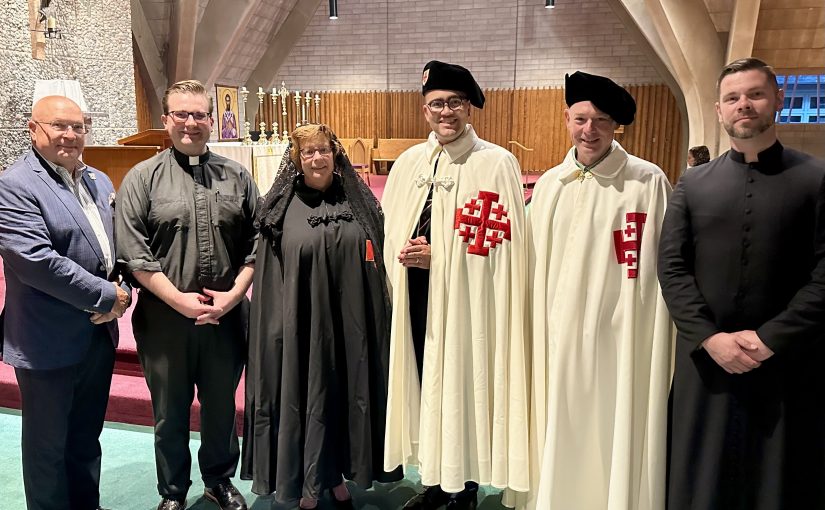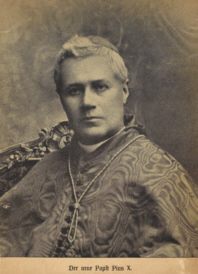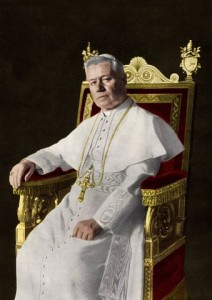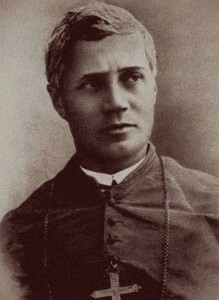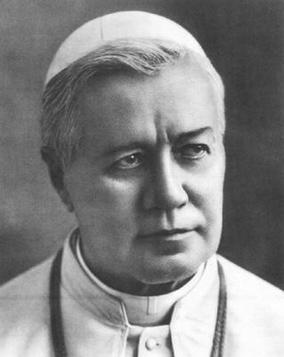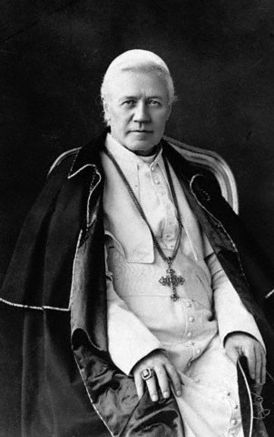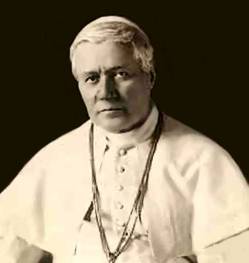 Today, we celebrate the liturgical memorial Saint Pius X and the centenary of his death. He was the 257th pope. The Eucharist, in part because of Pius, is far more central to our lives as Catholics than before him. His intuition and boldness of teaching open new doors to radical gift of the Holy Eucharist. Rome Reports has a brief presentation on Pius.
Today, we celebrate the liturgical memorial Saint Pius X and the centenary of his death. He was the 257th pope. The Eucharist, in part because of Pius, is far more central to our lives as Catholics than before him. His intuition and boldness of teaching open new doors to radical gift of the Holy Eucharist. Rome Reports has a brief presentation on Pius.
From the Discourse of Pope Pius XII at the Canonization of Pius X
Sanctity, which was the guide and inspiration of the undertakings of Pius X, shines forth even more clearly in the daily acts of his personal life. Before applying it to others, he put into practice in himself his program of returning all things to unity in Christ. As a humble parish priest, as bishop, as the Supreme Pontiff, he believed that the sanctity to which God called destined him was that of a priest. What sanctity is more pleasing to God in a priest of the New Law than that which belongs to a representative of the Eternal High Priest, Jesus Christ, Who left to His Church in the holy Mass the perennial memorial, the perpetual renovation of the Sacrifice of the Cross, until He shall come for the last judgment; and Who with this Sacrament of the Blessed Eucharist has given Himself as the food of our souls: “He that eateth this bread shall live forever.”
A priest above all in the Eucharistic ministry: this is the most faithful portrait of St. Pius X. To serve the mystery of the Blessed Eucharist as a priest, and to fulfill the command of Our Savior “Do this in memory of me” (Luke 22:19), was his way. From the day of his sacred ordination until his death as Pope, he knew no other possible way to reach such an heroic love of God, and to make a such generous return to that Redeemer of the world, Who by means of the Eucharist “poured out the riches of His divine Love for men” (Council of Trent, Session 13, chapter 2). One of the most significant proofs of his priestly sensibility was his ardent concern for the renewal of the dignity of worship, and his concern to overcome the prejudices of an erroneous practice, by resolutely promoting the frequent, and even daily, Communion of the faithful at the table of the Lord, without hesitation, leading children thereto, lifting them up, as it were, in his own arms, and offering them to the embrace of God hidden on the altars. From this, sprang up a new springtime of the Eucharistic life of the Bride of Christ.
In the profound vision which he had of the Church as a society, Pius X recognized in the Eucharist the power to nourish substantially its interior life, and to raise it high above all other human associations. Only the Eucharist, in which God gives Himself to man, can lay the foundations of a social life worthy of its members, cemented by love more than by authority, rich in its works and aimed at the perfection of individuals: a life, that is, “hidden with Christ in God.”
A providential example for today’s world, where earthly society is becoming more and more a mystery to itself, and anxiously searches for a way give itself a soul! Let it look, then, for its model at the Church, gathered around its altars. There in the sacrament of the Eucharist mankind truly discovers and recognizes its past, present, and future as a unity in Christ. Conscious of, and strong in his solidarity with Christ and his fellow men, each member of either Society, the earthly and the supernatural one, will be able to draw from the altar an interior life of personal dignity and personal worth, such as today is almost lost through insistence on technology and by excessive organization of the whole of existence, of work and even leisure. Only in the Church, the holy Pontiff seems to repeat, and though Her, in the Eucharist which is ‘‘life hidden with Christ in God,” is to be found the secret and source of the renewal of society’s life.
Hence follows the grave responsibility of those who, as ministers of the altar, have the duty of it is to open up to souls the saving treasure of the Eucharist. There are indeed many forms of activity which a priest can exercise for the salvation of the modern world; but only one of them is without a doubt the most worthy, the most efficacious, and the most lasting in its effects: to act as dispenser of the Holy Eucharist, after first nourishing himself thereof abundantly. His work would not be that of a priest, if, even through zeal for souls, he were to put his Eucharistic vocation in second place. Let priests conform their outlook to the inspired wisdom of Pius X, and orient every activity of their life and apostolate by the sun of the Eucharist.
